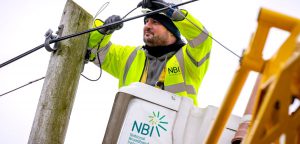I would like to thank the Chair and the Committee for the invitation to discuss the National Broadband Plan today.
I’m Peter Hendrick, CEO at National Broadband Ireland. I am joined by TJ Malone, who is CEO of NBI Deployment and leads the team building the NBI network. In addition, we have Senior Management Team members Tara Collins, responsible for marketing and communications, Barry Kelly, finance and Jenny Fisher, on governance and the interface with the Department of Communications.
The team and I know from our work with other Oireachtas Committees that it can be challenging to convey the size, scale and complexity of the NBP from a boardroom setting, therefore we have instigated a programme of field trips to show first-hand how the NBI network is being deployed. These sessions have been widely recognised as informative and helpful – and for this reason, there remains an open invitation to all Committee members to experience the work of our teams out in the field.
As the CEO of NBI, I remain incredibly proud of the work that our team is delivering, particularly against a backdrop of the turbulent conditions caused by Covid-19. NBI has been operating for 25 months, 23 of which have been under the shadow of the pandemic.
We believe that despite the extreme and turbulent conditions faced throughout the project to date, the work of our team provides a platform that gives us confidence to deliver the project on time and on budget.
Our teams have now scaled with construction active across all 26 counties, and over 1,200 people hired, onboarded and working on the project – that includes our specialist sub-contractors – the likes of Entegro, Indigo, KN Group, Secto, Actavo and TLI.
We’re also working with infrastructure operators such as open eir and Enet. I would like to acknowledge all the hard work that’s been done by everyone involved to date, and the collective commitment to bring high-speed broadband to those that need it most.
Across the project, we have already made major achievements:
- Over 298,000 premises have been surveyed, of which, over 252,000 are designed or are in detailed design.
These activities are vital precursors to the main build and are continuing at pace. - Over 54,500 premises are currently able to place their order via their preferred Retail Service Provider.
- There are over 154,000 premises constructed or under construction. For context, the original plan would have seen us at approximately 180,000 premises at this stage of the programme.
- We have now awarded contracts to our build partners for 195,000 premises, which includes network build due for completion in H1 2023.
- 475 Broadband Connection Points, including schools have been installed by NBI.
- We have also increased our minimum speeds from 150 megabits per second to offer 500 megabits per second, as well as offering a 1 Gig and now a 2 Gig product.
- We recently announced that we are delivering high speed broadband infrastructure to six islands off the coast of Donegal and Mayo – two of which we have completed in January.
- Some 50 Retail Service Providers have already signed up to sell services on the NBI network ensuring an increased range of products – all being offered at competitive prices for consumers.
As mentioned, right now, over 154,000 premises are either constructed or under construction. We believe this metric is the leading indicator in terms of delivering the programme.
For context, the equivalent figure this time last year was approximately 19,000 – so you can see how this is ramping up and how it will directly feed into the premises passed and connections numbers in time.
Additionally, we are implementing a series of initiatives that lend confidence to delivery in 2022 and beyond; including but not limited to the fact that we have contracted with Eir to increase the volume of pole replacement and duct installation which commenced from 1st October 2021.
Turning to other matters. I can appreciate that some recent media attention on the shareholder structure of NBI may have concerned members of the Committee. We endeavoured to clarify these matters in a transparent and open way at a Joint Oireachtas Committee two weeks ago and we welcome the opportunity to attend today to provide further clarifications.
Consequently, I would like to clarify the following points:
- The ownership structure remains as it was at the signing of the contract.
The shareholders of NBI Infrastructure DAC (the company which is party to the contract with the Minister) and NBI Deployment DAC (the company charged with design and construction of the network) are Metallah Limited and the Minister, who holds a special share with certain consent rights in respect of NBI Infrastructure DAC and NBI Deployment DAC.
The shareholder of Metallah Limited is Granahan McCourt Dublin Limited, and above Granahan McCourt Dublin Limited, there are other holding companies and investment vehicles into which the various investors have invested at different levels. This structure would not be unusual in the context of a major infrastructure project with a series of international investors.
David McCourt, via voting rights in each tier of the company structure, retains control of NBI.
- In relation to the potential for bringing in new investors to the project, I would clarify the following:
- As the risk profile of the project evolves, it is likely that some of our early-stage investors – who helped turn NBI from an idea into a reality at a point when there was still a lot of unquantifiable risk in the Project – will be replaced with investors who specialise in long-term investments.
- This has always been the plan and is the reason that mechanisms for ‘changes to ownership’ are allowed for in the contract, subject to approval from the Department, as is standard practice in such long-term contracts.
- The corporate structure, as it is today or into the future will not change NBI’s contractual commitments or collective goal – delivering the infrastructure that will radically transform the country’s broadband landscape.
- Any new investors will be required to “step into” their proportional share of the shareholders’ funding commitments.
- The shift to new investors who will bring this long-term capital will not cost the people of Ireland or the State any additional money and will not impact the day-to-day operations of the business.
- Separately, I want to make it abundantly clear and again categorically put on the record that the subsidy provided by the State is in satisfaction of NBI delivering project milestones as defined by the Project Agreement. NBI has not been and will not be paid by the State if it does not deliver these milestones.
For context, NBI can claim up to 92% of what is known as “Permitted Expenditure”, and this would include:
- Materials (for example – fibre, poles, ducts).
- Equipment (for example – optical hardware).
- Construction (for example – sub contractor fees associated with the build of the network or the connection of end user premises).
- Infrastructure (for example – the Eir make ready works or the leasing of infrastructure).
- No subsidy was used in the reimbursement of bid costs, all of which were incurred at risk in advance of contract award. Bid costs were funded by incoming shareholders and were always forecasted to be reimbursed in the first year of operations.
For your information, these costs relate primarily to the fees of the team of experts, approximately 80-100 people, working on the bid between Nov 2015 and Nov 2019.
- On the matter of the split of investment between equity and shareholder loans, this approach is very much in line with the funding approach in similar major infrastructure projects across Europe and the US. In fact, other State investment funds regularly use shareholder loan notes as part of their own investments in infrastructure projects on behalf of the State.
These shareholder loans are as much at risk as the equity portion of the investment. Both are unsecured and both will only receive a return if and when the project is successful and sufficient return has been generated.
Successful roll out of broadband delivers success for all parties. The State and its citizens gain access to high-speed broadband across the Intervention Area and NBI has the opportunity to generate commercial revenue. It is this revenue that allows the investors make a return on invested funds and the State to make a return through the clawback mechanisms.
The interest on shareholder loans forms part of the overall return on shareholder invested funds and is reflected in the overall financial model for the project which has been agreed with the Minister; and is subject to the same protections and clawbacks under the contract as returns on equity.
The 12% interest reflects the significant construction and commercial revenue risk that the investors are taking over a 25-year timeframe, however, as stated this return is dependent on project success.
This return is benchmarked with other infrastructure projects of a similar size, scale and complexity. Even in Ireland, it’s been reported that in the M8 PPP project, the interest on shareholder debt is 12.3%. We have a number of other project references that we would like to share with the Committee throughout the course of this morning.
I would like to conclude by saying that at NBI, we are acutely aware of how vital reliable, high-speed broadband has become to our lives.
The work of our team and our partners provides a platform that gives us confidence to deliver the NBP project. As the Eir make-ready works ramp up and we incorporate the lessons learned from the last 12 months into our planning processes, we are confident that we will be able to provide greater accuracy in future projections whilst allowing us to deliver the project on time and on budget.
We welcome the opportunity to take questions from the Committee.
*All data referenced is correct to February 4th 2022.



